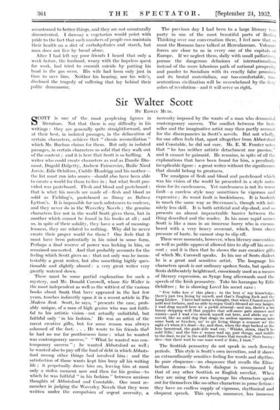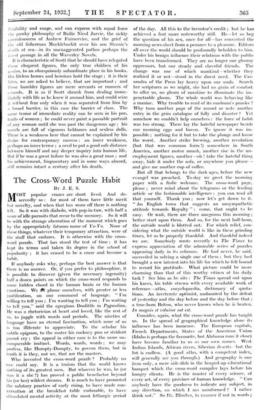Sir Walter Scott
BY EDWIN MUIR.
SCOTT is one of the most perplexing figures in literature. Not that there is any difficulty in his writings : they are generally quite straightforward, and at their best, in isolated passages, in the delineation of certain characters, achieve that " classic reconciliation " which Mr. Buchan claims for them. But only in isolated passages, in certain characters so solid that they walk out of the context ; and it is here that Scott is so baffling. A writer who could create characters as real as Dandle Din- mont, Dugald Dalgetty, Andrew Fairservice, Bailie Nicol Jarvie, Edie Ochiltree, Cuddle Headrigg and his mother— the list must run into scores—should also have been able to create a world for them to live in ; but what Scott pro- vided was pasteboard. Flesh and blood and pasteboard : that is what his novels are made of—flesh and blood as solid as Fielding's, pasteboard as flimsy as Bulwer Lytton's. It is impossible for such substances to coalesce, and they never do in the Waverley Novels ; the genuine characters live not in the world Scott gives them, but in another which cannot be found in his books at all ; and so, in spite of their solidity, they have a sort of meaning- lessness, they arc related to nothing. Why did he never create their proper world for them ? One feels that it must have been potentially in his mind in some form. Perhaps a final reserve of power was lacking in him, or remained unexerted. And that probably accounts for the feeling which Scott gives us : that not only was he incon- testably a great writer, but also something highly ques- tionable and slightly absurd : a very great writer very greatly watered down.
There must be some partial explanation for such a mystery, and Mr. Donald Carswell, whose Sir Walter is the most independent as well as the wittiest of the various books about Scott that have appeared in the last few years, touches indirectly upon it in a recent article in The ifodern Scot. Scott, he says, " presents the case, prob- ably unique, of a man of high genius who was not faith- ful to his artistic vision—not actually unfaithful, but faithful only ' in his fashion.' He was an artist of the rarest creative gifts, but for some reason was always ashamed of the fact. . . . He wrote to his friends that he had no use for -posthumous fame : what he wanted was contemporary success." " What he wanted was con- temporary success " ; lie wanted Abbotsford as well ; he wanted also to pay off the load of debt in which Abbots- ford among other things had involved him : and the satisfaction of those wants kept him busy all his writing life ; it perpetually drove him on, leaving him at most only a stolen moment now and then for his genius—to which he was faithful " in his fashion " between anxious thoughts of Abbotsford and Constable.. One must re- member in judging the Waverley Novels that they were written under the compulsion of urgent necessity, a necessity imposed by the wants of a man who demanded contemporary success. The conflict between the best- seller and the imaginative artist may then partly account for the discrepancies in Scott's novels. But not wholly, for one often feels that, apart altogether from Abbotsford and Constable, lie did not care. Mr. E. M. Forster notes that " he has neither artistic detachment nor passion," and it cannot be gainsaid. He remains, in spite of all the explanations that have been found for him, a peculiarly inexplicable figure : a great writer without the significance that should belong to greatness.
The amalgam of flesh and blood and pasteboard which was his vision of the world he presented in a style noto- rious for its carelessness. Yet carelessness is not its worst fault—a careless style may sometimes be vigorous and expressive ; its worst fault is bookishness. It is bookish in much the same way as Stevenson's, though with infi- nitely less skill. It is both artificial and slip-shod, and so presents an almost impenetrable barrier between the thing described and the reader. In his more rapid scenes Scott is like a man in an immense hurry who is encum- bered with a very heavy overcoat, which, from sheer pressure of haste, he cannot stop to slip off.
There were moments, however, when literary convention as well as public approval allowed him to slip off his over- coat ; and it is then that he shows the rare creative gifts of which Mr. Carswell speaks. In his use of Scots dialect he is a great and sensitive artist. The language his characters speak is not- ordinary spoken. Scots, but spoken Scots deliberately heightened, consciously used as a means of literary expression, as. Synge long afterwards used the speech of the Irish peasantry. Take his harangue by Edie Ochiltree ; he is showing Lovel. his secret cave : " Few folks ken o' this place ; to the best o' my -knowledge, there's just twa living by mysell, and that's Jingling Jock and the Lang Linker. I have had mony a thought, that when I faund myself auld and forfairn, and no-able to enjoy God's blessed air ony langer, I wad drag mysell here wi' a pickle aitmeal—and see, there's a bit bonny dripping well that poppies that self-same gate simmer and winter—and I wad e'en streek myself out here, and abide my re- moval, like an auld dog that drags its aweless ugsome carcass into some bush or bracken, no' to gie living things a scunner wi' the sight o't when it's dead—Ay, and then, when the dogi barked at tho lone farmstead,- the gude-wife wad cry, Whisht, stirra, that'll be auld Edie,' and the bits o' weans wad up, puir things, and toddle to the door, to pu' in the auld Blue:GoWn that mends a' their bonny. dies—but there wad be nao mair word o' Edie, I Crow.'.'
The Scottish peasantry do not speak in. such flowing periods. This style is Scott's own invention, and it shows an extraordinarily sensitive feeling for words and rhythm. In pure eloquence---:an eloquence that recalls the Eliza- bethan drama—his Scots dialogue is unsurpassed by that of any other Scottish or English novelist. When they are using their own language his characters speak out for themselves like- no other characters in prosefiction ; they have an endless supply of vigorous, 'rhythmical and eloquent speech. This speech, moreover; has immense flexibility and range, and can express -with equal force the pawky philosophy of Bailie Nicol Jarvie, the sickly querulousness of Andrew Fairservice, and the grief of the old fisherman Mucklebackit over his son Steenie's death at sea—in its unexaggerated pathos perhaps the finest passage in all the Waverley Novels.
It is characteristic of Scott that he should have relegated those eloquent figures, the only true children of his .renius, to an obsequiously subordinate place in his books. ilk lifeless heroes and heroines hold the stage ; it is their fates, we are asked to believe, that are important ; and those humbler figures are mere servants or runners' of errands. It is as if Scott shrank from dealing imme- diately with life as he knew it around him, and could seize it without fear only when it was separated from him by a broad barrier, in this case the barrier of class. The. same terror of immediate reality can be seen in his por- traits of women ; he could never paint a passable portrait: of any woman until she was past the dangerous age ; his novels are full of vigorous beldames and sexless dolls. There is a weakness here that cannot be explained by his desire for contemporary success : an inner weakness, perhaps an inner terror ; a need to put a good safe distance between himself and any deeper inquiry into human life. But if he was a great failure he was also a great man ; and his achievement, fragmentary and in some ways absurd, still remains intact a century after his death.































 Previous page
Previous page